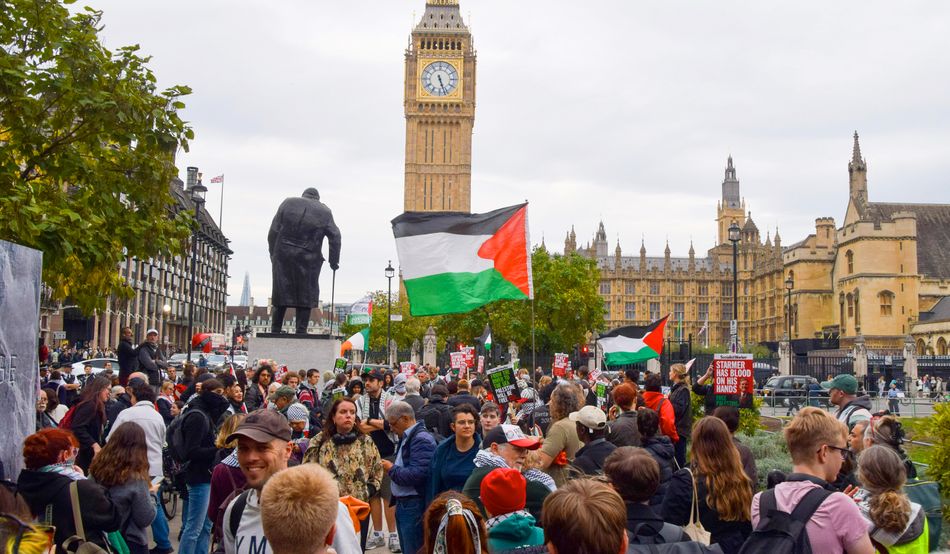As almost seven million people marched last weekend in the No Kings rallies across the United States, it was shocking to note that there are fewer formal national restrictions on protest and assembly in Trump’s America than there are in the United Kingdom.
As well as free speech and religious beliefs, the First Amendment to the US Constitution guarantees the right of people to assemble and demonstrate peacefully, which is how Americans still manage to protest against the administration without being menaced by police, the national guard or Trump’s paramilitary Immigration and Customs Enforcement (ICE). It would take two-thirds of Congress, followed by ratification by three-quarters of states, to remove that right from the American people. The only way Trump could suspend the First Amendment to deal with the protests, which Republicans suggest are filled with Antifa and Hamas supporters, would be to invoke the Insurrection Act of 1807, as he threatened during the marches for George Floyd.
This may yet happen between now and the 2026 midterms—my bet is that it will—but at present Americans are freer than the British to demonstrate. Without a constitution or proper Bill of Rights, protesters in the UK have little protection from the depredations of home secretaries wanting to look tough.
Many have wanted just that: our rights to protest and free assembly have been subject to successive attacks from Conservative and Labour home secretaries who, seemingly acting as one, did not worry about the permanent damage done to our democracy or creating laws that may be abused by a future far-right, authoritarian government.
Shabana Mahmood’s recent decision to grant police new powers to curb protest because of their “cumulative impact” further depletes our liberty. Police may now instruct organisers to move the site of a protest and enforce that decision with arrests and criminal charges.
This followed Priti Patel’s 2022 Police, Crime, Sentencing and Courts Act, which allowed police to impose conditions on the timing of events in order to prevent excessive noise, disruption or disorder. The day it was passed was described as a “dark day for civil liberties” by Amnesty International. Lord Peter Hain said the legislation represented “the biggest threat to British citizens’ right to dissent and non-violent protest in my lifetime... an authoritarian attack on the fundamental liberties of our citizens.”
A year later, with Suella Braverman as home secretary, came the Public Order Act, which introduced new offences, with year-long sentences, for locking on (fastening yourself to a building, for example), interfering with infrastructure and obstructing transport networks. It also granted greater stop and search powers to the police.
A lot of good people who protested on the universally significant issues of climate change and the extinction of species have been doing hard time because of these laws. And just to emphasise the point, consider how Trump’s Department of Justice under Kristi Noem would make use of the full panoply of recent British restrictions.
It is an astonishing fact that the most serious assaults on British liberty over the last three decades were on the watch of or were perpetrated by barristers: prime ministers Tony Blair and Keir Starmer and home secretaries Jack Straw, Suella Braverman and Shabana Mahmood. Why lawyers show such contempt for the traditions of dissent and free expression is a mystery. Only this year, the Appeal Court found against Braverman for using “Henry VIII powers”— ministerial decrees—to restrict protesters’ rights by lowering the threshold of what constituted serious disorder, damage and inconvenience to the life of a community. She had simply extended police powers by diktat to suppress legitimate protest without, of course, consulting parliament.
Mahmood’s latest move to curb protests for their cumulative impact is particularly damaging because—as I have learned through years of marching (against, among other things, nuclear weapons, war, Brexit and genocide in Palestine) and covering protests abroad—the cumulative impact of repeated peaceful protest is the key power left to people who are led by populists and have a biased media, oligarch money and bad men ranged against them.
Repetition is important, and so is mass. Harvard academic Erica Chenoweth, in a 2019 study of data collected from 323 violent and non-violent campaigns in the 20th century, found that peaceful campaigns work far better than violent ones and that it may only take 3.5 per cent of a country’s population participating actively to bring about change. Some 11.9m people—almost four million more than last weekend—would need to take part in the No Kings marches for them to reach that critical mass. That’s a tall order and those busy citizens might have to come out again and again to begin to rock the administration.
Such widespread protest doesn’t happen overnight, and anyone who’s been on those marches with me over the past 40 years will tell you that you don’t set out assuming you are going to achieve change. People march and protest because they can do no other. For me, protest is a part of self-expression and is about exercising my right to free speech in a free society. It’s a privilege I relish, and I often wonder how courageous I would be in a society like East Germany, where in September 1989 a few people began to gather outside the Nikolaikirche, Leipzig, every Monday evening after a prayers-for-peace service, holding candles and speaking about reform in the Communist GDR.
Just three months after the Chinese had ruthlessly crushed pro-democracy protests on Tiananmen Square, it was hard to conceive of a more hopeless project, and those members of Pastor Christian Führer’s congregation at the Nikolaikirche were fully aware of what the Stasi did in the Hohenschönhausen prison to break protesters. Yet, in just 65 days, this small, peaceful protest swelled to embrace the entire country, eventually leading to the fall of the Berlin Wall and the implosion of the Soviet Empire.
In Hong Kong (2019-2020) and Belarus (2020-2021), the autocrats outlasted the peaceful pro-democracy demonstrators, but in Ukraine’s Maidan Square in February 2014, after 100 lives were lost in a violent conflagration, the regime of Viktor Yanukovych collapsed. It remains to be seen what will happen in Tbilisi, Georgia, which on 28th October marks a year of continuous protests against the Georgian Dream party over the stolen 2024 election. The rallies have been met with violence from the security forces, and some of those arrested have been tortured—yet there is no sign of the protest movement flagging. Often, it is simply a question of which has the greater staying power, the people or the regime.
In the UK, we do not face these existential threats—yet. From 2006 to 2010, when I campaigned in the Observer and Guardian newspapers against the Labour government’s attack on civil liberties, I argued that it was the height of irresponsibility to do away with liberties that had taken centuries to accrue, particularly when you could never guarantee the nature of future governments. With the emergence of the hard-right Reform, which manifests all the worst anti-democratic traits of populism, that argument becomes ever more critical. It is easy to imagine Richard Tice as home secretary using Mahmood’s new restrictions to push demonstrations from central London to, say, Wandsworth Common on grounds of relieving stress to local communities.
Trump’s attempted putsch on freedoms and rights really could happen here, which is why Labour’s failure to reverse Conservative measures and, instead, add to the oppressive body of restraint is disappointing. More depressing is the way that pro-Palestinian demonstrations over the last two years have been demonised by a government anxious to display its pro-Israel credentials.
I have been on those marches, and the image of seething antisemitic mass is false. The chants and banners of the diverse crowds have been about the established facts of genocide, starvation and occupation. I have never heard antisemitic chants on such marches and, by the way, there are many Jewish people in the crowd and along the route, expressing their support. It just feels that on this, as with many things, Starmer is out of touch with reality.
I once appeared with both him, when he was head of the Crown Prosecution Service, and the former home secretary Ken Clarke in front of parliament’s Joint Committee on Human Rights to talk about the preceding decade of legislation hostile to liberty. Not much emerged from the afternoon, but I do remember thinking that he seemed uncomfortable sitting alongside us, and he didn’t show a lot of interest in the proceedings. He hurried off and left me and Clarke to answer the concerns of peers and MPs on the future of civil liberties in Britain.
Starmer now needs to concentrate, because the perils that we face some 15 years after that hearing are exactly what many of us foresaw. His government—indeed, the entire Labour party—needs to dedicate itself to shoring up liberty, rather than continually eroding its foundations for short-term expediency.
Given the risk of Trump’s best British friend, Nigel Farage, entering Number 10 after the next general election, to do anything else would be epically irresponsible.











